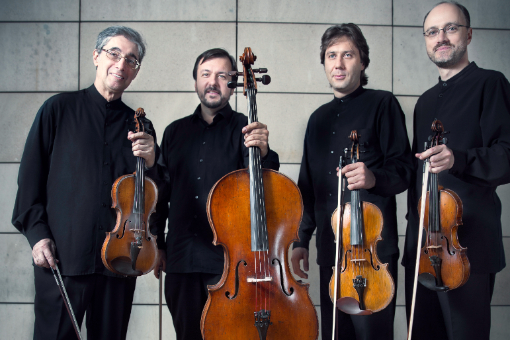Borodin Quartet brings Old World soul to Russian music

The Borodin Quartet performed Tuesday night at Coral Gables Congregational Church. Photo: Andy Staples
The music of Nikolai Miaskovsky is seldom heard on orchestral or chamber music programs but the venerable Borodin Quartet offered a rare performance of his Quartet No. 13 in A minor in their return to Friends of Chamber Music on Tuesday night.
Opening the program at Coral Gables Congregational Church, the 1950 score is a backward glance at 19th-century Russian romanticism through a 20th-century lens. A brooding melody launches the initial Moderato and immediately the Borodin’s deep well of string tone took center stage.
The quartet’s polished unity of ensemble still allows for individual members to take the spotlight. Violist Igor Naidin’s tonal warmth and projection and the soaring violin of Ruben Aharonian were memorable in solo moments. The Presto moderato is a classic scherzo a la Russe with rapid, intense rhythms. The broad melody of the third movement Andante, which could serve as the love theme for a 1950’s Hollywood melodrama, showcased the burnished mahogany sound of Vladimir Balshin’s cello. Catchy and energetic, the Molto vivo finale was brisk indeed. Had he lived in the mid 1940’s, one could well imagine Tchaikovsky writing this score. The Borodin foursome certainly made a case for more frequent performances of works by the prolific Miaskovsky.
While the Borodin is best known for performances of Russian music, particularly the quartets of Dmitri Shostakovich, it is a versatile group and a stylish, technically impeccable reading of Haydn’s Quartet No. 6 in D Major displayed its classical bona fides. This was sunny Haydn, played with spirited incisiveness. Aharonian’s violin phrased the singing line of the Andante with grace. The bows seemed to bounce off the strings in a robust Allegretto and the players captured the offhand quirky twists in the stately final movement. In a repeated minor-key episode, Balshin’s swaying cello figure masterfully blended with his colleagues’ more restrained blend.
Inevitably this quartet excels at the music of its namesake and the concluding performance of Borodin’s Quartet No. 2 in D Major did not disappoint. The opening theme of the first movement seemed to emanate from deep in Russia’s musical soul. Aharonian’s clean, no -onsense shaping of thematic motifs serves as a template for the group.
Their emotional projection is admirably controlled, avoiding over the top excess. Rather than the usual rush to the finish, the coda of the first movement was beautifully articulated at a moderate tempo which made the quiet final bars more potent. The famous melody of the Scherzo was given spacious treatment but the clarity of the surrounding whirling figurations was exceptional. Against the soft accents of Sergei Lomovsky’s violin, Balshin and Aharonian’s solos in the Nocturne had space and breadth. Sometimes played as a standalone piece, the movement emerged revitalized with the two violins blending so felicitously that they sounded as one. Attacking the concluding Vivace with great force, the players offered a textbook demonstration of melding idiomatic style with superior musicianship.
Following a well-deserved standing ovation, the quartet offered as a brief encore an arrangement of Tchaikovsky’s piano piece “Morning Prayer” (from his Album for the Young), played with noble depth of expression.
Friends of Chamber Music presents pianist Stephen Hough playing works by Bach, Busoni, Chopin, Hough and Liszt 4 p.m. March 31 at Temple Beth Am in Pinecrest. miamichambermusic.org
Posted in Performances
Leave a Comment
Wed Mar 20, 2019
at 12:50 pm
No Comments